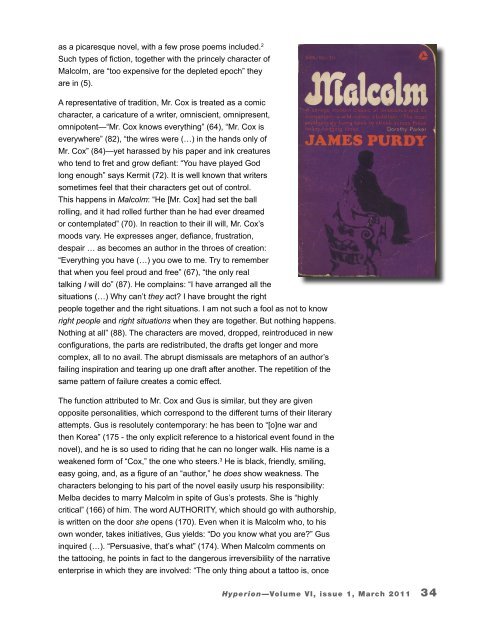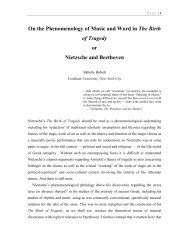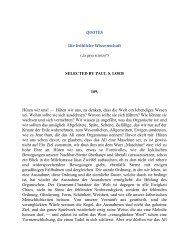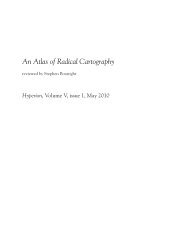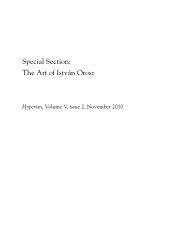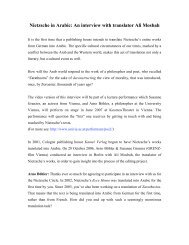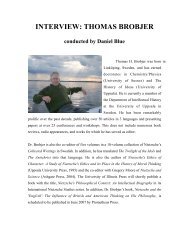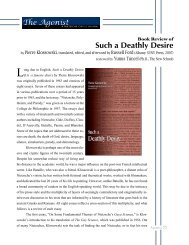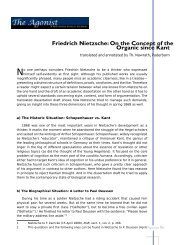Hyperion - Nietzsche Circle
Hyperion - Nietzsche Circle
Hyperion - Nietzsche Circle
You also want an ePaper? Increase the reach of your titles
YUMPU automatically turns print PDFs into web optimized ePapers that Google loves.
as a picaresque novel, with a few prose poems included. 2<br />
Such types of fiction, together with the princely character of<br />
Malcolm, are “too expensive for the depleted epoch” they<br />
are in (5).<br />
A representative of tradition, Mr. Cox is treated as a comic<br />
character, a caricature of a writer, omniscient, omnipresent,<br />
omnipotent—“Mr. Cox knows everything” (64), “Mr. Cox is<br />
everywhere” (82), “the wires were (…) in the hands only of<br />
Mr. Cox” (84)—yet harassed by his paper and ink creatures<br />
who tend to fret and grow defiant: “You have played God<br />
long enough” says Kermit (72). It is well known that writers<br />
sometimes feel that their characters get out of control.<br />
This happens in Malcolm: “He [Mr. Cox] had set the ball<br />
rolling, and it had rolled further than he had ever dreamed<br />
or contemplated” (70). In reaction to their ill will, Mr. Cox’s<br />
moods vary. He expresses anger, defiance, frustration,<br />
despair … as becomes an author in the throes of creation:<br />
“Everything you have (…) you owe to me. Try to remember<br />
that when you feel proud and free” (67), “the only real<br />
talking I will do” (87). He complains: “I have arranged all the<br />
situations (…) Why can’t they act? I have brought the right<br />
people together and the right situations. I am not such a fool as not to know<br />
right people and right situations when they are together. But nothing happens.<br />
Nothing at all” (88). The characters are moved, dropped, reintroduced in new<br />
configurations, the parts are redistributed, the drafts get longer and more<br />
complex, all to no avail. The abrupt dismissals are metaphors of an author’s<br />
failing inspiration and tearing up one draft after another. The repetition of the<br />
same pattern of failure creates a comic effect.<br />
The function attributed to Mr. Cox and Gus is similar, but they are given<br />
opposite personalities, which correspond to the different turns of their literary<br />
attempts. Gus is resolutely contemporary: he has been to “[o]ne war and<br />
then Korea” (175 - the only explicit reference to a historical event found in the<br />
novel), and he is so used to riding that he can no longer walk. His name is a<br />
weakened form of “Cox,” the one who steers. 3 He is black, friendly, smiling,<br />
easy going, and, as a figure of an “author,” he does show weakness. The<br />
characters belonging to his part of the novel easily usurp his responsibility:<br />
Melba decides to marry Malcolm in spite of Gus’s protests. She is “highly<br />
critical” (166) of him. The word AUTHORITY, which should go with authorship,<br />
is written on the door she opens (170). Even when it is Malcolm who, to his<br />
own wonder, takes initiatives, Gus yields: “Do you know what you are?” Gus<br />
inquired (…). “Persuasive, that’s what” (174). When Malcolm comments on<br />
the tattooing, he points in fact to the dangerous irreversibility of the narrative<br />
enterprise in which they are involved: “The only thing about a tattoo is, once<br />
<strong>Hyperion</strong>—Volume VI, issue 1, March 2011 34


